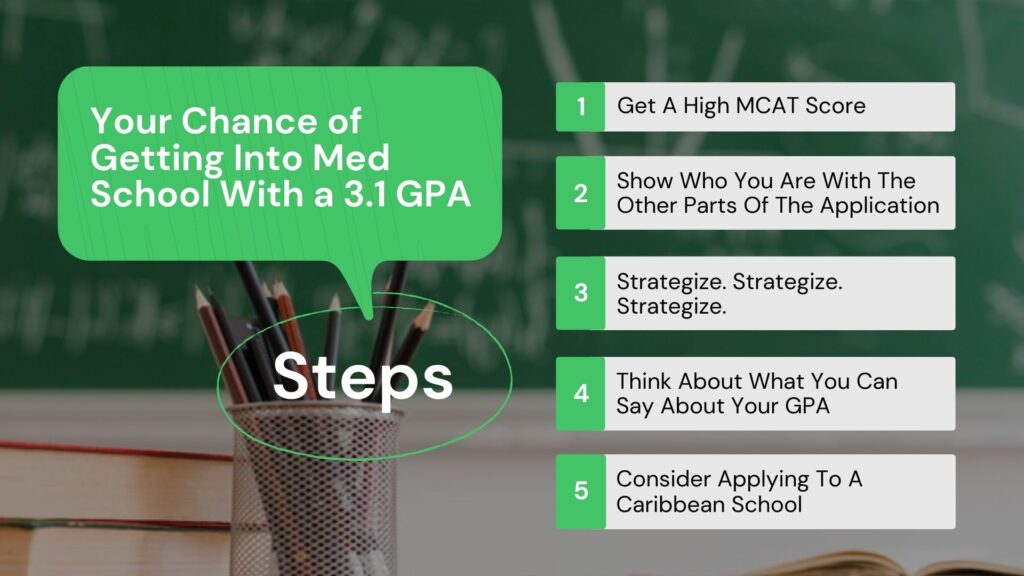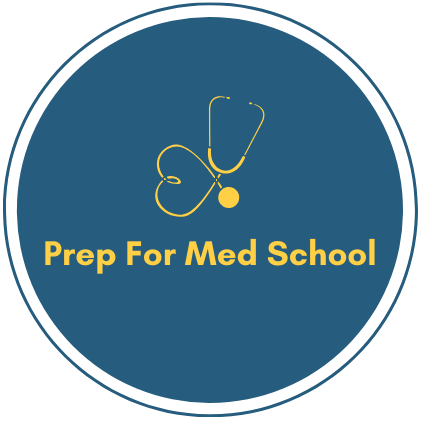It will be a bit difficult, but not impossible, to get into medical school with a 3.1 GPA.
The average median GPA was 3.72, and generally fell around 3.4 or higher, based on U.S. News 2019 Best Medical School rankings.
There isn’t a minimum GPA requirement at most medical schools, but maintaining a 3.0 GPA or higher is highly suggested by admissions experts. But 3.0 is the bare minimum and you would be hard-pressed to get into a medical school without a stellar MCAT score.
Based on recent numbers, the probability of getting into medical school with a 3.1 GPA is 15.7% to 54.7%, depending on your MCAT scores and whether you choose the MD or DO route. Below, we delve into the metrics and explore what you can do to increase your chances.
What The Metrics Say
Let’s look at the data. According to AAMC numbers from 2017-2018 to 2019-2020, the overall acceptance rate of all allopathic medical school applicants with a GPA between 3.00 and 3.19 was 16.9%. The rates were stratified based on applicant MCAT scores.
The higher the MCAT score, the greater the relative likelihood of getting an acceptance was. With a GPA between 3.00 and 3.19, a 502-505 MCAT score had a 20.7% acceptance rate, 33.5% with a 510 – 513 MCAT score, and 54.7% with an MCAT score greater than 517.
| 3.00-3.19 GPA | MCAT Score | 502-505 | 506-509 | 510-513 | 514-517 | Greater than 517 |
| Acceptance Rate | 20.7% | 25.9% | 33.5% | 43.3% | 54.3% |
With a 3.1 GPA, your chances of being accepted into an allopathic medical school is around 20% to 54%. If you have an overall GPA between 2.80 and 3.19, your chances of getting into an osteopathic school is about 15.7%.
A variety of factors may impact your chances including MCAT score, science GPA, experience, and so forth.
See what your chances of getting into medical school with a 3.1 GPA with our LizzyM calculator. This Matches target schools with your GPA and MCAT.
How Can I Be More Competitive?
Short term, there isn’t a lot you can do that can quickly turn your GPA around, but there are some things that can make you more competitive.
Can I Really Not Save My GPA?
Well, there are some things you can do with a low GPA.
One thing to note is that your science GPA is more important than your overall GPA.
If you’re a college freshman or sophomore with a 3.1 GPA, don’t despair–you can still get it close to 3.5. First, reflect and see what dragged your GPA down. Reach out for help to create effective study plans. Focus on creating an upward trend for your GPA. In fact, buffing your studying skills now will help you score better in tougher science classes as an upperclassman. In the long run, you can raise your science GPA, build an upward trajectory, and show tenacity!
If you are a junior or senior, consider retaking a class or taking a post-baccalaureate program. This will give you a chance to do better. Getting an A in a class you got a C in can show effort and speak volumes about your dedication. Otherwise, taking a gap year or two can be beneficial as well! Read on to see what you can do.
How Else Can I Buff Up My Application?
Besides GPA, medical schools want to see your passion for medicine. What better way to show them than clinical experience (or related extracurriculars)? Consider taking a gap year or two to explore opportunities that will give you relevant healthcare exposure or pursue your other passions.
Scribing (or medical assistant roles) is a popular gap year activity because students gain shadowing experience, professional skills, letters of support, and an impactful personal statement–all while getting paid. Another option is to work as a research assistant at a lab to gain research experience, and sometimes, a publication or two.
Don’t forget to always pursue your passions! The experience you gain from what you are passionate about will define you more than anything else in life. What medical schools look for in applicants are the experiences and qualities of a key physician. This includes skills like empathy, communication, and teamwork.
If you are not confident with your current GPA, a gap year may just be what you need to enhance your application. The median age of matriculants is twenty-four, which means many people take some time off after college before applying.
For now, you should pay attention to what other requirements you need for applying to medical school.
Should I Still Apply?
Based on 2019 metrics alone, an offer from osteopathic schools is roughly as likely as from allopathic schools (15.7% vs 16.9%, respectively).
Optimize your chances by being strategic about your application. Students are still getting in…so not all hope is lost!
- Get A High MCAT Score
Getting a high MCAT score will exemplify your ability to overcome difficult tests and academic rigor. The data shows a 20.7% jump to a 54.3% acceptance rate when MCAT scores are above 517 from around 500.
An excellent MCAT score is quite telling because your medical training will include a series of licensing exams. Schools want to know that you can handle the rigor of medical education and tackle all those exams.
- Show Who You Are With The Other Parts Of The Application
The medical school application also includes sections for extracurricular activities, clinical experience, letters of recommendation, research experience, and other stuff (e.g. honors and awards).
Use these sections to highlight characteristics that make you a great addition to the student community and the future healthcare workforce. The goal of your application is just to get an interview first.
- Strategize. Strategize. Strategize.
Be realistic when deciding where to apply to. Research and use tools like the AAMC
MSAR to help you stratify what schools are “far reaches,” “reaches,” or “targets.” While some schools have no or low minimum GPA requirements, their incoming student profiles will show you what they look for.
In fact, use matriculant data to evaluate your chances. Think about other factors that may help you. For instance, in-state schools generally prefer to take in-state residents. If you need help, make sure to reach out to your pre-med advisor to tailor a school list.
At the end of the day, no matter which school you get into, you will have a degree and license to practice. You are still a doctor. That’s all that matters.
- Think About What You Can Say About Your GPA
3.1 is by no means low, but the rigor of medical school and onward makes it important that you can do well academically. When you do get an interview, make sure you are able to talk about your low GPA. If you got an interview, they already like what they see–so now is your time to explain yourself if needed.
If you were dealing with something that affected your grades significantly, talk about it. It may even be a plus if you can speak about it in a collected manner. It’ll demonstrate your maturity in handling difficult situations and your phenomenal communication skills.
- Consider Applying To A Caribbean School
One of the choices many people decide on if all other choices fail is applying to Caribbean school.
However, you should be warned that graduates of Caribbean medical schools generally have residency match rates that are roughly 30% lower than graduates of medical schools based inside the United States. Match rates for Carribean medical students hover at roughly 60% while both DO/MD programs that are inside the United States have match rates above 90%.
Do a lot of research and weigh your options before deciding!

The Final Thought
A 3.1 GPA is at least the minimum suggested by experts and definitely above medical schools’ minimum requirement, but may make it a bit tougher to stand out. Balance it out with a stellar MCAT or passion for medicine.
A good physician is more than just a good test taker. It takes real grit to get through the journey so keep at it!
What other questions do you have? What advice might you share with fellow pre-meds? Feel free to share and comment below and let us know what you think.







